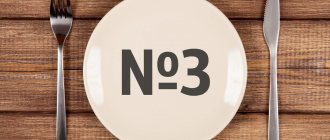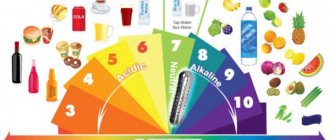Diet table 4 is prescribed for diseases of the gastrointestinal tract, accompanied by severe diarrhea and bloating. The main goal is to eliminate unpleasant symptoms. Let's figure out what foods you can eat and how to prepare them correctly.
Nutritional therapy is a prerequisite for the rapid recovery of patients with gastrointestinal diseases. At the beginning of the twentieth century, the famous scientist and founder of Soviet dietetics Manuil Pevzner developed a system consisting of 15 diets, each of which is suitable for certain ailments.
What can you eat if you have diarrhea?
- Diet for diarrhea should include foods high in pectin: applesauce, bananas, yogurt. Pectin, a water-soluble fiber, helps relieve intestinal upset.
- Pay attention to foods rich in potassium - fruit juices, jacket potatoes, bananas. When there is an intestinal disorder, the body actively loses potassium and needs to be restored.
- Don't forget to add salt to your dishes. Meals should include salty soups, broths, crackers, etc., which will help retain water in the body and avoid dehydration.
- Get enough protein. If you have an intestinal upset, you can eat lightly fried beef, turkey, chicken or hard-boiled eggs to avoid fatigue and tiredness.
- Eat vegetables and fruits after hot processing. Some raw vegetables and fruits can make diarrhea worse. While on a diet, try a simple soup with asparagus, carrots, beets, zucchini, mushrooms or celery, cream soup or jacket potatoes.
Up to contents
Diet for diseases of the gastrointestinal tract
Diet for gastrointestinal diseases is an important addition to treatment. Compliance with certain dietary restrictions can significantly improve your well-being, speed up recovery and prevent new relapses of the disease.
The famous nutritionist and therapist M.I. Pevzner developed therapeutic diets intended for people with diseases of the digestive tract. A specific nutritional regimen should be selected by the attending physician, taking into account the diagnostic results, the stage of the disease, the acidity of gastric juice and the presence of concomitant disorders. Strict dietary restrictions are typical for the acute form of the disease. During the period of remission, nutritional requirements are not so stringent.
“Healthy and harmful foods” for gastrointestinal diseases
Diseases of the gastrointestinal tract are accompanied by inflammation and damage to the mucous membrane, dysfunction of the digestive organs; patients are strictly contraindicated from foods that irritate the mucous membrane of the digestive tract, increase intestinal motility and cause excessive production of gastric juice. Fried foods stimulate bile formation, release carcinogens, and support the inflammatory reaction on the walls of the digestive tract.
It is recommended to completely avoid the following products:
- smoked meats;
- canned food;
- sausages;
- fresh baked goods;
- sauces, marinades;
- fatty meats, especially pork, lamb;
- legumes;
- sour fruits;
- fresh onions and garlic;
- cabbage;
- fatty cheeses.
The correct diet for diseases of the gastrointestinal tract can only be prescribed by a doctor, based on the individual characteristics of your body. Most likely, he will recommend steaming, boiling or baking food.
The basis of a therapeutic diet for gastrointestinal disorders is:
- porridges prepared with filtered water or skim milk;
- first courses with vegetable or light meat broth;
- main courses of poultry, veal, sea and river fish;
- vegetable salads, stewed vegetables, mashed potatoes without butter on the side
People with chronic disorders of the digestive system are prohibited from consuming:
- alcohol;
- coffee;
- sweet sparkling water;
- sour juices.
Dairy products rich in bifidobacteria are beneficial, in particular:
- fermented baked milk;
- curdled milk;
- low-fat kefir;
- homemade yogurt.
Depending on the diagnosed disease, dietary restrictions may vary. Diet plays a primary role in many ways, but may not always be the only method of helping the body. In some cases, a course or lifelong use of medications may be required.
Since the gastrointestinal tract is a coordinated system of different organs, a disorder in one of them can provoke a disorder in another. For example, a malfunction of the biliary system can affect the quality of digestion. This happens because bile triggers a cascade of reactions necessary for the production of digestive enzymes. These enzymes are secreted by the pancreas and enter the intestines to help digest food. If bile flows intermittently, then a lack of enzymes may occur. As a result, the body may not receive enough necessary substances from food and experience heaviness after eating, bloating, flatulence, and sometimes diarrhea.
Another striking example is pancreatitis, a disease of the pancreas itself. In this case, the organ begins to produce fewer enzymes than necessary, which also affects the quality of digestion.
Therapeutic nutrition for gastrointestinal diseases
Pathologies of the stomach, esophagus and intestines occupy leading positions in the list of the most common diseases of our time. Moreover, in most cases, people themselves become the sources of problems. The likelihood of getting a dangerous gastrointestinal disease increases many times if you do not follow the diet and have an unhealthy lifestyle. Often, doctors, having determined the type of illness, prescribe a gentle type of therapy, and in the first stages they recommend streamlining your menu and avoiding foods that irritate the mucous membrane of the stomach or esophagus. How effective is this diet? Possibilities of a therapeutic diet and the main tenets of a healthy diet In order for a change in diet to bring only benefits, it is necessary to take into account a huge number of different factors and individual characteristics of the body. For example, fasting is useful for gastritis, but for peptic ulcers this approach can aggravate the situation.
Basics of therapeutic nutrition for gastrointestinal diseases:
- you should not overeat (for increased stomach sensitivity, it is better to eat often, but in small portions);
- Dry food is prohibited (solid food is retained in the body and causes complications);
3. the diet is compiled taking into account the necessary energy for normal life (a strict diet will worsen immunity);
- When cooking, it is better to give preference to boiling or heat treatment with steam (frying releases a large amount of harmful substances).
Recommendations from nutritionists and gastroenterologists
In order for therapeutic nutrition for the gastrointestinal tract to bring positive results, it must be combined with drug treatment.
A number of tips that help with all diseases.
1.Eat slowly, chewing your food thoroughly. It has been proven that finely ground product is easier to digest and does not provoke an inflammatory process.
- Exclude from the menu drinks that have a strong tonic effect. Coffee, strong tea, energy drinks, and sweet carbonated water harm the intestines and esophagus.
3.Control the temperature of the food. In case of negative changes in the functioning of the gastrointestinal tract, food must be warm.
- Limit herbs and spices. Very often, pepper, vinegar, and mustard become catalysts for pathological changes. Try to replace hot seasonings with herbs, bay leaves, and cumin.
- Avoid fats for a while. Doctors usually advise leaving only vegetable oil and butter.
We also need to mention the correct cooking method. Most experts agree that heat treatment in a water bath or in a double boiler is optimal. Frying in Teflon-coated pans is allowed, since with such cooking there is no need to add fat.
Allowed and prohibited products for gastrointestinal pathologies
You don’t need to think that a therapeutic diet is just restrictions and tasteless food. In fact, even with diseases of the internal organs, you can eat a varied diet and enjoy your food.
For the first course, soups made from various types of cereals (semolina, rice, oatmeal), vegetables (carrots, potatoes, celery), lean meat (chicken, veal, beef) or seafood are recommended. The main thing is that all ingredients are thoroughly chopped.
Main courses are best prepared from boiled potatoes, rice, and pasta (homemade). The side dish is served with stewed vegetables, boiled meat or fish fillet. Separate mention should be made of dairy products. Before adding them to your diet, you should definitely consult with your doctor, since the fermented milk environment is ideal for the proliferation of pathogenic bacteria. But for peptic ulcers or chronically high acidity, such nutritional elements are very useful. You can expand the menu with sour cream, low-fat cream, cottage cheese, kefir. Therapeutic nutrition for diseases of the gastrointestinal tract rarely includes fresh vegetables and fruits. Usually they are included in the daily regimen in the form of juices, compotes, and mousses. Jams, preserves and jams are also useful. Each disease is unique and requires a special approach. There is no general strategy for choosing an effective diet. In the early stages, you can simply limit yourself to certain dishes, but in the later stages, you may have to give yourself several fasting days or take advantage of the possibilities of pharmacotherapy. Do not hesitate to ask your doctor any questions you have about diet.
ODP doctor
Starokozheva G.A.
What should you avoid if you have diarrhea?
- Avoid drinks and foods that contain caffeine or are very hot or cold. It will irritate the gastrointestinal tract.
- During the diet, avoid fatty, fried and heavy foods. Eating this way will only make your intestinal upset worse.
- Avoid foods that cause gas accumulation in the intestines - chewing gum, carbonated drinks. They irritate the digestive tract.
- Limit milk and dairy products. They may be hard to digest.
- Avoid nuts, raw fruits and vegetables, bran and whole grain bread in your diet. They irritate the digestive tract.
Try not to smoke or drink alcohol.
A complete list of what to eat for diarrhea is contained in the “Table No. 4” diet.
Up to contents
Basic principles of nutrition
Food must contain the required amount of proteins, fats and carbohydrates. To quickly normalize the functioning of the digestive organs, it is important to adhere to the basic rules:
- Eat small meals, at least 5–7 times a day. The intervals between meals should not exceed three hours. Let the portions be small for the first few days: no more than 200 g. This will reduce the load on the digestive tract, increase the digestibility of food, and activate the functioning of the stomach and intestines.
- Maintain drinking regime. Drink at least 2 liters per day. Drink 50-100 ml of water every half hour. It is recommended to drink mineral or filtered water without gas.
- Eat chopped foods. Puréed food is easier to digest. Food should be boiled or steamed. All food and liquids must be warm: between 15 and 50 °C.
- Avoid foods that increase secretion in the stomach and intestines. These include complex carbohydrates in raw form: sour berries, fruits, starchy vegetables, plant fiber.
- Avoid alcoholic drinks completely. Alcohol inhibits regeneration processes and strains the kidneys and liver. Reduce the amount of salt. You are allowed to consume no more than 6 g per day, that is, less than one teaspoon.
After food poisoning, the diet should be especially strict. Add new dishes to your diet gradually, carefully monitor your health.
The main goals and objectives of normalizing nutrition for gynecological disorders
Advances in dietetics in recent years show how important normalization of patient nutrition remains for the treatment and prevention of many diseases. In most cases, dietary nutrition is included in complex treatment. Individual diets are recommended by doctors in the presence of gynecological diseases, for problems associated with dysfunction of the reproductive organs of the female body.
The tasks that nutritionists face to solve problems in gynecology are the following:
- normalization of the basic functions of the reproductive organs and reproductive system of the female body;
- normalization of the body's immune system, increasing immune functions at the local level.
Numerous women's diseases often develop into chronic inflammation, which over time depletes the body's immune forces and reduces the overall tone of the body. Complete proteins are needed as significant support for the immune system. Protein is found in required quantities in sea fish, eggs and dairy products. With meat the issue is separate. Lean meat can be included in the diet, but it should be semi-finished beef, rabbit or poultry.
For information. Industrial poultry meat and broilers are not suitable for consumption due to gynecological disorders and diseases. The reason for this is the high content of hormonal drugs in poultry meat used for growth speed.
Protein is used to synthesize cells of the human immune system and improve the functioning of the hematopoietic organs. In case of severe and heavy bleeding, which occurs in some cases with gynecological diseases, the presence of products containing protein is extremely necessary. The lack of low-fat meat can be compensated by the liver, which is a source of useful microelements and vitamin B.
The main purpose for which patients are prescribed dietary nutrition is to activate the body’s internal resources. Normalization of nutrition increases the body's response, the resistance of body systems to various infections and external pathogens.
Diet therapy is an integral part of the complex treatment of gynecological diseases and sexual dysfunctions. Nutrition normalized through diet has a beneficial effect on the general physical condition of a woman and promotes a speedy recovery. Many gynecologists recommend dietary nutrition to women as a way to prevent the formation of a precancerous condition. In each individual case, the diet does not mean starting a strict fast and abstaining from excessive consumption of calories. The main task of dietary nutrition is to normalize a nutritious diet, which will contain a variety of foods and contain the required number of calories.
Effect of Coffee on FD Symptoms
It is known that drinking coffee stimulates the production of hydrochloric acid by stomach cells. The alkaloid caffeine, which is part of coffee, also affects gastric motility. Research has found that drinking coffee may increase or cause symptoms of FD. However, it is still unclear how a particular dose of caffeine in coffee affects the onset of symptoms.
Recommendation for patients with FD who note the appearance or intensification of symptoms of the disease after drinking coffee: reduce the number of cups of the drink during the day or give up coffee altogether.
Types of disorder
Diet for indigestion is a must!
This sensitive organ responds with negative reactions to a variety of reasons that disrupt its functioning. Depending on the category to which your stomach upset falls, an effective diet is recommended.
Digestive disorders in gastroenterology are classified into the following types:
- organic disorders,
- functional disorders.
The causes of organic disorders are considered to be bad habits and poor nutrition. The functioning of the stomach is disrupted by a sedentary lifestyle, prolonged forced sitting during work, alcohol and smoking abuse, and a large amount of spicy food in the diet. All these factors irritate the mucous membrane, destroying beneficial microflora and disrupting digestion.
Food is not completely digested, stagnation of food, its fermentation causes pain in the stomach and irritation. To cleanse the body of toxins, diarrhea occurs. In this case, fortification of food and diet help normalize digestion.
Functional indigestion is caused by gastrointestinal diseases and their consequences: gastritis, peptic ulcer, hernia, reflux esophagitis. In this case, it is impossible to do without a full examination and long-term treatment, consisting of a complex of various drugs. In this case, the diet will help compensate for the negative effects of medications and obtain useful substances for a full metabolism.
Does your back hurt with pneumonia without a cough or fever?
The symptom occurs in atypical forms of pneumonia, including pneumonia associated with COVID-19.
It is known that in patients with COVID-19, back pain may appear even before respiratory symptoms and the loss of smell typical of coronavirus infection. Due to the absence of fever and cough, patients do not suspect that they are infected with coronavirus and are at risk of developing pneumonia. Back pain can occur several days after the first symptoms of Covid. Thus, one of the American doctors who suffered a coronavirus infection said that the pain he experienced was comparable to the pain of being hit with a baseball bat. The pain, which appeared after several days of high fever, was so severe that the man had to move around holding onto furniture and walls.








